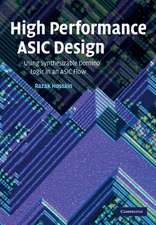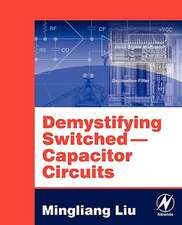Low-Voltage CMOS Log Companding Analog Design: The Springer International Series in Engineering and Computer Science, cartea 733
Autor Francisco Serra-Graells, Adoración Rueda, José L. Huertasen Limba Engleză Hardback – 30 iun 2003
| Toate formatele și edițiile | Preț | Express |
|---|---|---|
| Paperback (1) | 636.63 lei 6-8 săpt. | |
| Springer Us – 7 dec 2010 | 636.63 lei 6-8 săpt. | |
| Hardback (1) | 644.63 lei 6-8 săpt. | |
| Springer Us – 30 iun 2003 | 644.63 lei 6-8 săpt. |
Din seria The Springer International Series in Engineering and Computer Science
- 24%
 Preț: 1041.97 lei
Preț: 1041.97 lei - 20%
 Preț: 643.50 lei
Preț: 643.50 lei - 18%
 Preț: 1225.62 lei
Preț: 1225.62 lei - 18%
 Preț: 965.02 lei
Preț: 965.02 lei - 20%
 Preț: 646.12 lei
Preț: 646.12 lei - 18%
 Preț: 948.79 lei
Preț: 948.79 lei - 20%
 Preț: 646.62 lei
Preț: 646.62 lei - 15%
 Preț: 637.46 lei
Preț: 637.46 lei - 20%
 Preț: 643.83 lei
Preț: 643.83 lei - 18%
 Preț: 949.23 lei
Preț: 949.23 lei - 20%
 Preț: 644.48 lei
Preț: 644.48 lei - 20%
 Preț: 994.92 lei
Preț: 994.92 lei - 20%
 Preț: 645.97 lei
Preț: 645.97 lei - 18%
 Preț: 946.87 lei
Preț: 946.87 lei - 20%
 Preț: 995.57 lei
Preț: 995.57 lei - 18%
 Preț: 956.99 lei
Preț: 956.99 lei - 20%
 Preț: 644.98 lei
Preț: 644.98 lei - 15%
 Preț: 649.54 lei
Preț: 649.54 lei - 18%
 Preț: 950.21 lei
Preț: 950.21 lei - 18%
 Preț: 1221.38 lei
Preț: 1221.38 lei - 18%
 Preț: 957.62 lei
Preț: 957.62 lei - 15%
 Preț: 643.99 lei
Preț: 643.99 lei - 18%
 Preț: 948.47 lei
Preț: 948.47 lei - 18%
 Preț: 947.35 lei
Preț: 947.35 lei - 20%
 Preț: 1284.65 lei
Preț: 1284.65 lei - 20%
 Preț: 1633.95 lei
Preț: 1633.95 lei - 20%
 Preț: 1285.78 lei
Preț: 1285.78 lei
Preț: 644.63 lei
Preț vechi: 758.38 lei
-15% Nou
Puncte Express: 967
Preț estimativ în valută:
123.37€ • 127.44$ • 102.67£
123.37€ • 127.44$ • 102.67£
Carte tipărită la comandă
Livrare economică 25 martie-08 aprilie
Preluare comenzi: 021 569.72.76
Specificații
ISBN-13: 9781402074455
ISBN-10: 140207445X
Pagini: 220
Ilustrații: XXV, 192 p.
Dimensiuni: 155 x 235 x 18 mm
Greutate: 0.54 kg
Ediția:2003
Editura: Springer Us
Colecția Springer
Seria The Springer International Series in Engineering and Computer Science
Locul publicării:New York, NY, United States
ISBN-10: 140207445X
Pagini: 220
Ilustrații: XXV, 192 p.
Dimensiuni: 155 x 235 x 18 mm
Greutate: 0.54 kg
Ediția:2003
Editura: Springer Us
Colecția Springer
Seria The Springer International Series in Engineering and Computer Science
Locul publicării:New York, NY, United States
Public țintă
ResearchCuprins
Mosfet Modeling for Companding.- Amplification and AGC.- Filtering.- PTAT Generation.- Pulse Duration Modulation.- Dynamic Range.- Industrial Application: Hearing Aids.- Conclusions.
Recenzii
From the reviews:
"Without question this is an important book. It formulates and analyzes concepts and principles that may significantly influence the next trend in development of low-voltage low-power mixed-signal SoC designs. This book is very timely and well written. … I think that the book is a fine contribution to the … texts in this field, and will represent a welcome addition to the library literature on this topic. I will certainly hold this book in my library and recommend to anyone working in this area." (Mile Stojcev, Microelectronics Reliability, Vol. 44, 2004)
"The book explains low-voltage CMOS log companding design … . It does explain the building blocks for companding design and thoroughly explains each building block. … The book really explains the design well … it is recommended for graduate students … ." (IEEE Circuits & Devices Magazine, Vol. 21 (6), 2005)
"Without question this is an important book. It formulates and analyzes concepts and principles that may significantly influence the next trend in development of low-voltage low-power mixed-signal SoC designs. This book is very timely and well written. … I think that the book is a fine contribution to the … texts in this field, and will represent a welcome addition to the library literature on this topic. I will certainly hold this book in my library and recommend to anyone working in this area." (Mile Stojcev, Microelectronics Reliability, Vol. 44, 2004)
"The book explains low-voltage CMOS log companding design … . It does explain the building blocks for companding design and thoroughly explains each building block. … The book really explains the design well … it is recommended for graduate students … ." (IEEE Circuits & Devices Magazine, Vol. 21 (6), 2005)











